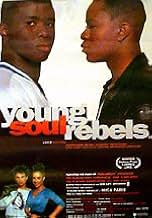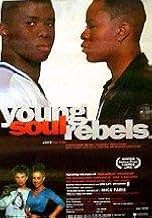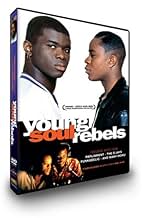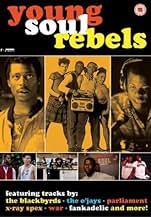Two disc jockeys have a friend's murder to solve in the fringe-group melting pot of 1977 London.Two disc jockeys have a friend's murder to solve in the fringe-group melting pot of 1977 London.Two disc jockeys have a friend's murder to solve in the fringe-group melting pot of 1977 London.
- Director
- Writers
- Stars
- Awards
- 1 win total
Eamonn Walker
- Carlton
- (as Eamon Walker)
- Director
- Writers
- All cast & crew
- Production, box office & more at IMDbPro
Featured reviews
My review was written in May 1991 after a screening in the International Critics Week section of the Cannes Film Festival.
Too many ingredients are mixed in the stew of Isaac Julien's debut pic "Young Soul Rebels", an intermittently entertaining saga of countercultures in 1977 London.
Picture's London black milieu and murder mystery plotlines recall the classic Janet Green-scripted "Sapphire" over 30 years ago, but Julien keeps digressing from the main story to cover interesting yet tangential topics.
Theme, hammered away between musical or romantic interludes, concerns many forms of intolerance and stereotyping. Blacks and gays are the key protagonists, while ohter subgrps liek punks , soul music fans in Britain, half-castes (a theme echoing "Sapphire") and even Scottish nationalists are given attention.
Chris (Valentine Nonyela) and Caz (Mo Sesay) are two fledgling deejays broadcasting from the pirate radio station WEFUNK a form of black-oriented disco music. Their friend Terry James is murdered by a white man during a homosexual tryst in the park. Chris accidentally obtains an audio tape of the murder from TJ's boombox.
Chris halfheartedly tries to break into the mainstream via Metropolitan radio station, where he meets and romances a beautiful production assistant Tracy (Sophie Okonedo). Caz is revealed to be gay, and splits from his long-time partner to take up with a punk-styled white deejay Billibud (James Durr).
With Queen Elizabeth's Silver Jubilee as a backdrop (and target for frequent satire of the establishment) pic establishes its thriller credentials at the outset but is poorly paced. Director Julien's inclusion of homoserotic love scenes is no longer a cinematic novelty, yet their placement distracts from the main narrative (especially a lengthy bed scene of Caz and Billibud late in the film).
Styling of aggressively androgynous Valentine Nonyela in the central hetrerosexual role misleads rather than adds to the film's relentless attack on stereotypes.
Pic's most successful element is Nina Kellgren's high-contrast lighting that gives it a modern, futuristic look. Nostalgia content is covered by disco-era music ranging from Roy Ayers to War plus dancing to match. After the most obvious murder suspect is identified and in lame duck fashion disposed of, Julien adds a friendly ensemble dance scene for closure that doesn't ring true.
Young cast is attractive and enthusiastic and Frances Barber guests in a droll turn as Chirs' free =psirited white mom. Frequent male crotch (clothed) closeups a la Pasolini and the homosexual mileu should limit as well as define the film's potential audience. Some thick accents (French subtitles at Cannes definitely helped comprehension) are a drawback to Stateside acceptance.
Too many ingredients are mixed in the stew of Isaac Julien's debut pic "Young Soul Rebels", an intermittently entertaining saga of countercultures in 1977 London.
Picture's London black milieu and murder mystery plotlines recall the classic Janet Green-scripted "Sapphire" over 30 years ago, but Julien keeps digressing from the main story to cover interesting yet tangential topics.
Theme, hammered away between musical or romantic interludes, concerns many forms of intolerance and stereotyping. Blacks and gays are the key protagonists, while ohter subgrps liek punks , soul music fans in Britain, half-castes (a theme echoing "Sapphire") and even Scottish nationalists are given attention.
Chris (Valentine Nonyela) and Caz (Mo Sesay) are two fledgling deejays broadcasting from the pirate radio station WEFUNK a form of black-oriented disco music. Their friend Terry James is murdered by a white man during a homosexual tryst in the park. Chris accidentally obtains an audio tape of the murder from TJ's boombox.
Chris halfheartedly tries to break into the mainstream via Metropolitan radio station, where he meets and romances a beautiful production assistant Tracy (Sophie Okonedo). Caz is revealed to be gay, and splits from his long-time partner to take up with a punk-styled white deejay Billibud (James Durr).
With Queen Elizabeth's Silver Jubilee as a backdrop (and target for frequent satire of the establishment) pic establishes its thriller credentials at the outset but is poorly paced. Director Julien's inclusion of homoserotic love scenes is no longer a cinematic novelty, yet their placement distracts from the main narrative (especially a lengthy bed scene of Caz and Billibud late in the film).
Styling of aggressively androgynous Valentine Nonyela in the central hetrerosexual role misleads rather than adds to the film's relentless attack on stereotypes.
Pic's most successful element is Nina Kellgren's high-contrast lighting that gives it a modern, futuristic look. Nostalgia content is covered by disco-era music ranging from Roy Ayers to War plus dancing to match. After the most obvious murder suspect is identified and in lame duck fashion disposed of, Julien adds a friendly ensemble dance scene for closure that doesn't ring true.
Young cast is attractive and enthusiastic and Frances Barber guests in a droll turn as Chirs' free =psirited white mom. Frequent male crotch (clothed) closeups a la Pasolini and the homosexual mileu should limit as well as define the film's potential audience. Some thick accents (French subtitles at Cannes definitely helped comprehension) are a drawback to Stateside acceptance.
I am currently writing a paper on this film and another for one of my film classes, Topics in National Cinemas, as it was one of the films we examined. While perusing this page for certain information I needed i happened to read the previous comment that someone had posted regarding what they thought of the film.
While reading this individual's comments it occurred to me that they COMPLETELY misunderstood the film and what it set out to challenge and address. This film is NOT a murder mystery. Yes, a murder occurs and sets off the story, but it is no more essential to the plot than is the youth in a coma in La Haine (Kassovitz, 1995). Like La Haine, this film sets out to address social issues pertaining to race, class, positioning in the political landscape, and, unlike La Haine, sexuality (which seemed to greatly disturb the previous individual who posted).
Young Soul Rebels examines the social landscape of late 1970s Britain, and particularly how it affects youths within the greatly marginalized "Black" culture. It confronts issues of diaspora, through the juxtaposition of different aspects of the "Black" culture, as in the rastas working at the garage, compared with the two, funk obsessed (and much more "Afro-English") main characters. It also looks at the intersection at which certain sub-cultural borders collide, as in the Punks, the Funks, and the Reggaes, as well as Hetero and Homosexuality. Ultimately this notion of collision is key to understanding this film for what it is, which is precisely identities in collision. If the previous individual who posted had understood this, then they would have also seen how the murderer's motives implied this idea of identity collision, were driven by it and pertained more to it than to reading the film as a simple "whodunnit." In this light, you'll also find that music drives the film, both as a signifier for identities, and as an expression of them. Music is certainly an essential component to this film.
For more information regarding the issues this film juggles, and for a greater understanding of its concepts and meanings, look at the writings of Paul Gilroy, particularly his book "Ain't No Black in the Union Jack," and the film's director, Isaac Julien.
While reading this individual's comments it occurred to me that they COMPLETELY misunderstood the film and what it set out to challenge and address. This film is NOT a murder mystery. Yes, a murder occurs and sets off the story, but it is no more essential to the plot than is the youth in a coma in La Haine (Kassovitz, 1995). Like La Haine, this film sets out to address social issues pertaining to race, class, positioning in the political landscape, and, unlike La Haine, sexuality (which seemed to greatly disturb the previous individual who posted).
Young Soul Rebels examines the social landscape of late 1970s Britain, and particularly how it affects youths within the greatly marginalized "Black" culture. It confronts issues of diaspora, through the juxtaposition of different aspects of the "Black" culture, as in the rastas working at the garage, compared with the two, funk obsessed (and much more "Afro-English") main characters. It also looks at the intersection at which certain sub-cultural borders collide, as in the Punks, the Funks, and the Reggaes, as well as Hetero and Homosexuality. Ultimately this notion of collision is key to understanding this film for what it is, which is precisely identities in collision. If the previous individual who posted had understood this, then they would have also seen how the murderer's motives implied this idea of identity collision, were driven by it and pertained more to it than to reading the film as a simple "whodunnit." In this light, you'll also find that music drives the film, both as a signifier for identities, and as an expression of them. Music is certainly an essential component to this film.
For more information regarding the issues this film juggles, and for a greater understanding of its concepts and meanings, look at the writings of Paul Gilroy, particularly his book "Ain't No Black in the Union Jack," and the film's director, Isaac Julien.
Been a long time since I saw this movie, but whenever I think of it, or even just hear that song from the soundtrack, I feel all happy and <ahem> gay. Funny thing is, I went back to see what I'd noted about it at the time (1991), and apparently I'd only considered it a so-so film!
So, yes, perhaps the story line was a bit flimsy, perhaps all of the movie didnt amount to a whole much ... but if the memory of it still makes me smile after ten years, it must've been a lot better than I'd originally realised! ;-)
So, yes, perhaps the story line was a bit flimsy, perhaps all of the movie didnt amount to a whole much ... but if the memory of it still makes me smile after ten years, it must've been a lot better than I'd originally realised! ;-)
I am amazed at the lack of knowledge displayed by the previous reviewer. I first saw this film in the 90s and watched it again last night. I was part of this general scene in southern England at that time and I have to say that the music, dancing and fashions are completely accurate. This nonsense about Afros and flares, that belonged in the early 70s, by 77 all that had changed. And yes, punks and soul boys were mixing in the clubs, fashions crossed over even earlier, the plastic "jelly" sandals and winkle picker shoes, all adopted from the punks in late 76/77.If anybody had walked in with flares there would have been howls of laughter.
firstly this film has some mistakes in it,i was a soul girl back int he day,punks and soul boys weren't pally,but not enemies either,the didn't go to the same clubs,the fashion is correct but the music is out of time ,some of the music came out maybe up to 2 years later,that apart it does pick up the atmosphere of the day and the vibe and is at least acknowledging the soul scene,and the cult of soul boys and girls ,a major thing,but very unknown which is odd,i guess the write must have a bit of info of the movement,still as a fun film its OK and does bring a few
memories i think unless you were part of the scene you would find this
a bit dull,it is hollow ,but the clothes and dancing are all spot on,although gay guys did have there own disco clubs,again fairly underground as back then it wasn't as tolerated as it is,rightly so,now as so many other films have been made about punks and skinheads it god to see a movie reflecting a little known but extremely popular movement
memories i think unless you were part of the scene you would find this
a bit dull,it is hollow ,but the clothes and dancing are all spot on,although gay guys did have there own disco clubs,again fairly underground as back then it wasn't as tolerated as it is,rightly so,now as so many other films have been made about punks and skinheads it god to see a movie reflecting a little known but extremely popular movement
Did you know
- TriviaThe film takes place in 1977.
- GoofsThe two punk bands GBH and Conflict weren't around in 1977.
- ConnectionsFeatured in Queerama (2017)
- SoundtracksP. Funk Wants To Get Funked Up
Performed by Parliament
Licensed Courtesy of Casablanca Records Inc/Polygram Records Inc (New York)
- How long is Young Soul Rebels?Powered by Alexa
Details
Box office
- Gross US & Canada
- $225,664
- Opening weekend US & Canada
- $2,609
- Nov 24, 1991
- Gross worldwide
- $225,664
Contribute to this page
Suggest an edit or add missing content





























